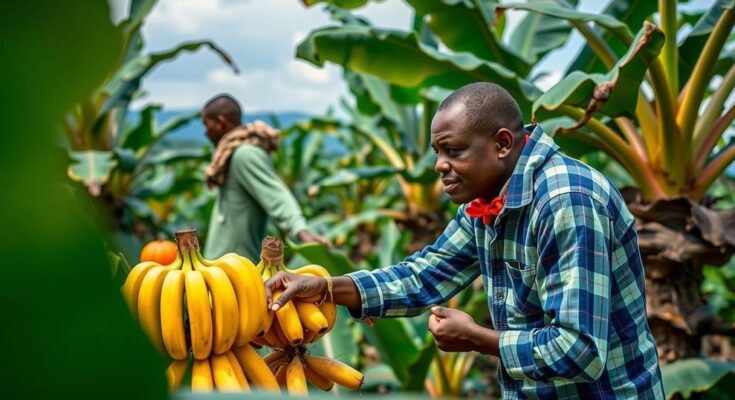A new insurance project in Uganda aims to help banana farmers cope with extreme weather caused by climate change. The program, supported by UNEP, combines digital technology and financial protection to safeguard farmers like Justine Ahumwire, who suffered significant crop losses from a recent storm. With plans to expand the initiative to thousands more farmers, the project not only provides financial assurance but also teaches sustainable agricultural practices, enhancing overall resilience to climate impacts.
Farmers in Uganda, particularly banana farmers, are increasingly facing threats from extreme weather events due to climate change. Justine Ahumwire, a banana farmer from Shuku, experienced firsthand the devastation caused by a storm, losing 300 banana trees and two cows, which left her family in dire financial straits. In response to these challenges, the NDC Action Project, a collaboration between the United Nations Environment Programme (UNEP) and the UNEP Copenhagen Climate Centre, aims to provide farmers with insurance that can mitigate losses from extreme weather. As the Chief of UNEP’s Adaptation and Resilience Branch, Mirey Atallah highlighted the vulnerabilities faced by smallholders, stating, “We know farmers, particularly smallholders, are struggling to adapt to the effects of the climate crisis.” This project not only provides financial protection but combines it with technical assistance to bolster resilience against weather-induced disasters. Bananas play a crucial role in Uganda’s economy, with a significant portion of farmers involved in banana cultivation. However, weather patterns have become increasingly erratic, leading to prolonged droughts and excessive rains, which threaten agricultural stability. Florence Muranga, Director of the Banana Industrial Research and Development Centre, noted the severity of these risks, remarking, “[Farmers] can lose their food, their livelihood, their house in one day.” The centre has been instrumental in expanding insurance access among banana farmers, training them to use smartphones for damage reporting and insurance claims. The integration of technology has proven vital. The initiative has trained 930 farmers in digital literacy, enabling them to document their crop health and damage from storms. This digital approach reduces the need for in-person inspections, streamlining the claims process and easing financial burdens. Additionally, farmers receive education on sustainable practices, which not only enhances their productivity but also minimizes insurance payout risks. Following the success of the initial program, there are plans to expand the insurance model to include 50,000 banana farmers across Uganda, affirming the project’s scalability. For Justine, this initiative offers reassurance: “I know that if [my crops get damaged] I have help. It is not like in other years, where I would have to start from zero.” This approach aligns with UNEP’s broader objectives under the Paris Agreement, focusing on mitigating climate change effects across different sectors. The Sectoral Solution aims to achieve global temperature goals and includes agriculture as a key area for intervention.
The increasing frequency and severity of extreme weather events attributed to climate change are considerably impacting agricultural communities, especially smallholder farmers in Uganda. Banana farming, which is essential to Uganda’s economy, is particularly vulnerable to these changes. Recent trends have shown a shift in growing seasons and unexpected droughts, compelling farmers to seek protective measures against potential crop and livestock losses. The introduction of insurance schemes, supported by technological advancements, represents a progressive response to these agricultural challenges, allowing farmers more resilience and stability in the face of climate threats.
In summary, the novel insurance initiative spearheaded by the NDC Action Project offers a critical lifeline for Uganda’s banana farmers, who face significant challenges from climate change. By integrating technology and financial resources, the project enhances farmers’ resilience against extreme weather events, allowing them to protect their livelihoods and ensuring food security. The scaling of this program promises to reach more farmers across the country, fostering a more sustainable agricultural sector in the face of a changing climate. UNEP’s ongoing efforts to support such initiatives are crucial for achieving broader climate stabilization objectives, particularly in vulnerable agricultural communities.
Original Source: www.unenvironment.org




